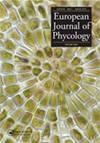一种基础潮间带海藻的亲本环境调节子代的热耐受性
IF 1.7
4区 生物学
Q2 MARINE & FRESHWATER BIOLOGY
引用次数: 4
摘要
在全球变暖情景下,获得热耐受性是一种重要的生态生理性状,因为它可以使生物体和种群适应,特别是在生命周期最敏感的早期阶段。本研究采用季节性作为自然情景,探讨了亲代热历史是否可以调节形成冠层的潮间带海藻(Fucus guiryi)在生态相关的热梯度(15-28°C)上的热耐性。为此,我们在最大和最小累积热暴露期(夏末和冬末)和夏季开始时从父母身上采集胚胎。在个体发育早期,我们以初始胚胎大小、内部营养含量、存活、生长和发育阶段作为性能指标,以确定亲本驯化是通过供给还是亲本效应调节热耐受性。冬末供体的耐热性最强,适宜生长和存活的温度范围更广,温度上限更高,这可能与亲本菌体提供的食物更好有关。在25°C以上,新兵生理适应性下降,表现为生长停滞、发育受损和存活率下降,但功能丧失在初夏更为突然。夏末响应证实了自然种群存在热硬化现象,但在季节尺度上,这种热耐受性增加的适应意义远低于冬季亲本供给引起的适应意义。高温诱导的耐热性发生于夏初至夏末,这是由于亲代暴露在温暖环境中。然而,冬季供应促进了更大的耐热性获得。在夏季开始时暴露于适度的热胁迫下,没有事先进行季节性驯化,导致最低水平的热耐受性和后代适应性的丧失。虽然温暖的冬季可能是中性的或有利于早期发育,但夏季开始时温度升高和营养状况不良可能会降低存活率并阻碍种群补充。东北角藻的耐热性在寒冷季节后期逐渐增强。初夏新兵在变暖条件下的存活率最低。新员工的季节性表现可能受到父母环境的影响。本文章由计算机程序翻译,如有差异,请以英文原文为准。
Parental environment modulates offspring thermal tolerance in a foundational intertidal seaweed
Abstract Thermotolerance acquisition is an important ecophysiological trait under global warming scenarios because it can allow organisms and populations to adapt, particularly during the most sensitive early stages of a life cycle. Here we used seasonality as a natural scenario to explore whether parental thermal histories can modulate thermotolerance of recruits of a canopy-forming intertidal seaweed (Fucus guiryi) across an ecologically relevant thermal gradient (15–28°C). For this purpose, we harvested embryos from parents after the periods of maximum and minimum accumulated heat exposure (late summer and late winter), and at the onset of summer. During early ontogeny we followed initial embryo size, internal nutrient content, survival, growth and developmental stages as performance metrics to address whether parental acclimation modulates thermal tolerance via provisioning or parental effects. Late winter recruits of F. guiryi exhibited the greatest thermotolerance, showing a broader range of optimal temperatures and higher upper thermal limits for growth and survival, probably associated with better provisioning from parental thalli. Physiological fitness of recruits decreased above 25°C, showing arrested growth, impaired development and dropping survival rates, but functional loss was more abrupt in early summer. Late summer responses confirmed that heat hardening occurs in natural populations, but at the seasonal scale the adaptive significance of this increased thermotolerance is much lower than that induced by winter parental provisioning. Heat-induced thermotolerance occurred from early to late summer due to parental exposure to warming. However, winter provisioning promoted greater thermotolerance acquisition. Exposure to moderate thermal stress at the onset of summer without prior seasonal acclimation resulted in minimum levels of thermal tolerance and loss of offspring fitness. While warmer winters might be neutral or benefit early development, increasing temperatures and poor nutritional conditions at the onset of the summer season may reduce survival and hamper population recruitment. Highlights Thermotolerance of Fucus guiryi increased towards the late cold season. Early summer recruits had the lowest survival under warming. Seasonal performance of recruits might be driven by parental environment.
求助全文
通过发布文献求助,成功后即可免费获取论文全文。
去求助
来源期刊

European Journal of Phycology
生物-海洋与淡水生物学
CiteScore
4.80
自引率
4.20%
发文量
37
审稿时长
>12 weeks
期刊介绍:
The European Journal of Phycology is an important focus for the activities of algal researchers all over the world. The Editors-in-Chief are assisted by an international team of Associate Editors who are experts in the following fields: macroalgal ecology, microalgal ecology, physiology and biochemistry, cell biology, molecular biology, macroalgal and microalgal systematics, applied phycology and biotechnology. The European Journal of Phycology publishes papers on all aspects of algae, including cyanobacteria. Articles may be in the form of primary research papers and reviews of topical subjects.
The journal publishes high quality research and is well cited, with a consistently good Impact Factor.
 求助内容:
求助内容: 应助结果提醒方式:
应助结果提醒方式:


